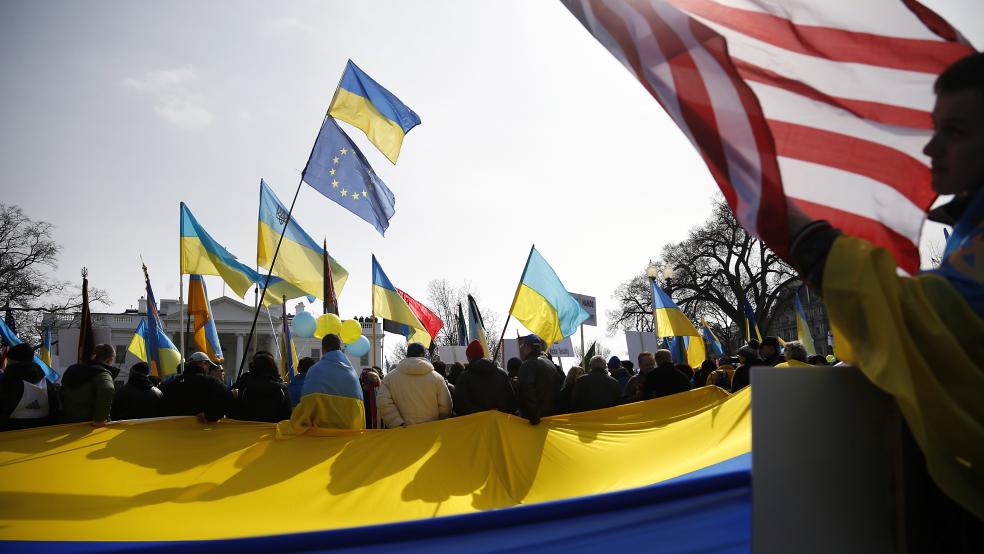There was a time, in the days following the missile attack that brought down Malaysia Airlines flight MH17, when it appeared that the sheer volume of international revulsion at the death of 298 innocent people and the subsequent mistreatment of their remains by separatist rebels in Eastern Ukraine might force Russian president Vladimir Putin to scale back his support for the rebellion.
The events of the past week, sadly, showed the opposite to be true. According to U.S. intelligence reports, not only has Russia been shelling Ukrainian troops from across the border, but the flow of arms and materiel into the rebel held areas has continued to flow over the border. And far from accept responsibility for arming and training the rebels who appear to have used a sophisticated Russian-made surface-to-air missile to shoot down the airliner, Putin and his allies have denounced what they call the United States’ “lies” about the disaster.
Related: Sorry Hillary, the Russian Reset Never Worked
Ukrainian Foreign Minister Pavlo Klimkin, appearing on CBS’s Face the Nation, said that in addition to denying investigators and other experts access to the crash site, separatist rebels were destroying infrastructure and continuing to accumulate weapons supplied by Russia.
“It’s about a clear attempt to destabilize eastern Ukraine,” he said. “It’s about disrupting any kind of critical infrastructure. If you are even theoretically a separatist you would like more independence and you would like to live on your own land. But why…disrupt all kinds of infrastructure? Electricity networks, water and gas pipelines.”
He said that he believes Putin’s aim is to destabilize Eastern Ukraine, in the hope that its problems will extend to the rest of the country.
The combination of the MH17 shoot-down and Russia’s increasingly aggressive stance toward Ukraine appears to finally have moved European leaders to agree to stronger sanctions against Putin’s government. In addition, the U.S. is reportedly in talks with the Ukrainian government about the possibility of supplying more advanced weaponry – a step the U.S. has so far avoided.
Related: Let Europe Do the Heavy Political Lift with Putin
On Sunday, speaking on CNN’s State of the Union, deputy national security adviser Ben Rhodes said that new and stronger sanctions were in the works. Asked if Germany in particular, which imports much of its energy from Russia, is willing to participate in stronger sanctions, Rhodes was unequivocal.
“Yes,” he said. “President Obama has spoken to those leaders and they indicated at their meeting last week at the European Council that the energy sector, the arms sector and the financial sector are on the table for European sanctions. We’re going to continue to develop that package…and we are confident there is going to be strong action.”
Asked when, he said that European leaders had committed to act before the end of July, meaning that an announcement is expected within the next few days.
Rhodes also suggested that the U.S. is in discussion with Ukraine about providing its military with more advanced weaponry.
Related: Four Ways NATO Could Affect the Ukraine Crisis
After he listed some of the non-lethal aid the U.S. has provided, Rhodes was interrupted by host Candy Crowley.
“But they have said, ‘We really need lethal weapons.’”
He replied directly, “Well, we’ve initiated a discussion with them about what a long-term training and equipping relationship would be…so that they have more modernized and professionalized security forces so that they can provide for security in the country, and we’re also very focused on what we can do to help them secure that border.”
Crowley asked him to clarify that he was, in fact, saying that the U.S. was considering supplying lethal weapons, and Rhodes said that was correct, though no specific commitments have yet been made.
Related: Why Europe Is Hesitant to Punish Russia
Calls from Congress for the U.S. to take stronger action in Ukraine also increased this week, with the introduction of legislation directing the U.S. to supply more military aid, and criticism of Europe’s tepid response, so far, to the crisis in its backyard.
“We should raise the economic sanctions that really hurt Russia already further,” said Sen. Chuck Schumer (D-NY). “We should remind the Europeans…that they should not be like 1938 Europe where appeasement governed. If they appease Putin they will not stop him [and] he will get worse.”
He said the international community ought to take various diplomatic responses, from taking steps to expel Russia from the World Trade Organization to refusing to hold the World Cup soccer tournament there in 2018.
We should do everything we can to get the Europeans to stop this policy of appeasement,” he repeated. “It will just make Putin stronger and we’ll pay a bigger price later.”
Top Reads from The Fiscal Times:
- Chikungunya, and Other Diseases You Now Have to Worry About
- Paul Ryan’s State-Based Poverty Plan Could Assure “Two Americas”
- Jeb Bush Warns GOP on Immigration Reform





